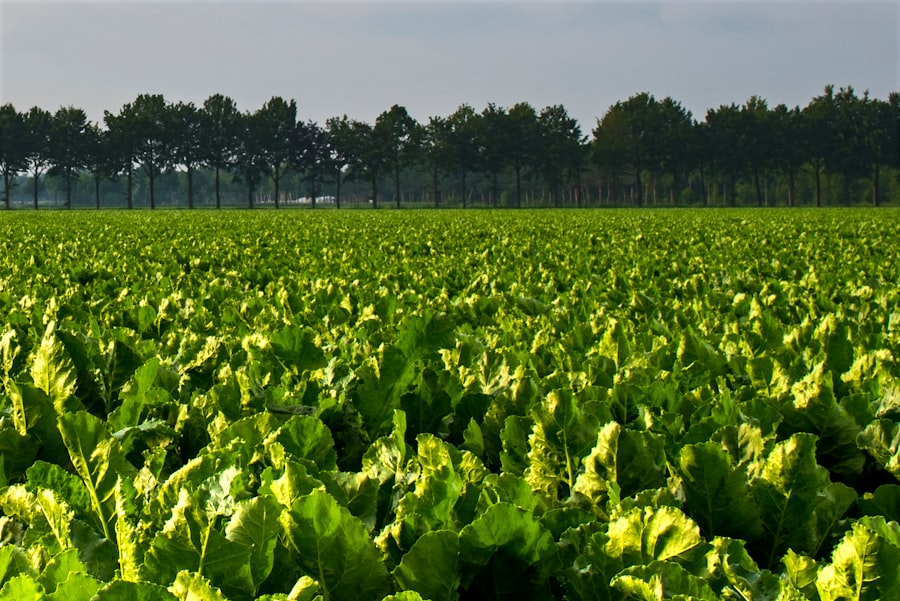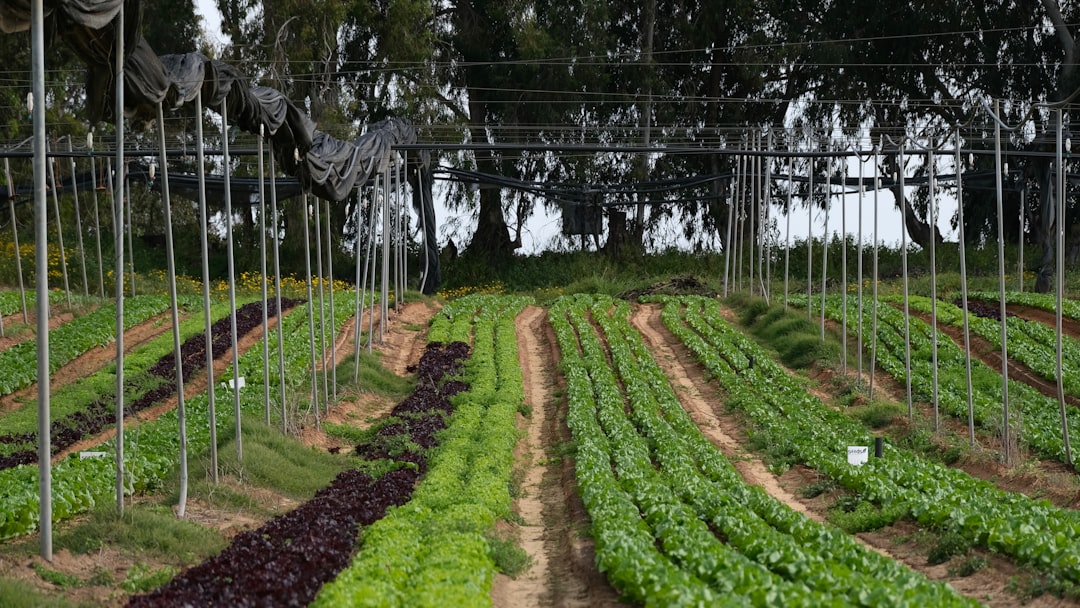Biotechnology in agriculture represents a transformative approach to food production, leveraging scientific advancements to enhance the efficiency and sustainability of farming practices. This field encompasses a range of techniques, including genetic engineering, molecular markers, and tissue culture, all aimed at improving crop resilience, nutritional value, and overall yield. The integration of biotechnology into agriculture is not merely a trend; it is a response to the pressing challenges posed by a growing global population, climate change, and the need for sustainable farming practices.
As the world grapples with food security issues, biotechnology emerges as a beacon of hope, offering innovative solutions that can help meet the demands of the 21st century. The application of biotechnology in agriculture has sparked significant debate among stakeholders, including farmers, consumers, and policymakers. Proponents argue that biotech crops can lead to increased productivity and reduced reliance on chemical inputs, while critics raise concerns about potential environmental impacts and food safety.
Despite these discussions, the adoption of biotech solutions continues to grow globally, with countries like the United States, Brazil, and India leading the way in cultivating genetically modified organisms (GMOs). As we delve deeper into the various facets of biotechnology in agriculture, it becomes evident that its potential extends far beyond mere crop enhancement; it encompasses a holistic approach to sustainable agricultural practices.
Key Takeaways
- Biotechnology offers innovative tools to enhance pest and disease management in agriculture.
- It plays a crucial role in increasing crop yield and improving crop quality.
- Biotech advances contribute to better soil health and efficient nutrient management.
- Water conservation and management in farming benefit significantly from biotech applications.
- Biotechnology supports climate change mitigation and reduces the environmental impact of agriculture.
Biotech Solutions for Pest and Disease Management
One of the most significant contributions of biotechnology to agriculture is its ability to address pest and disease management challenges. Traditional methods of pest control often rely on chemical pesticides, which can have detrimental effects on non-target organisms and lead to the development of resistant pest populations. In contrast, biotech solutions offer targeted approaches that minimize environmental impact while effectively managing agricultural pests.
For instance, genetically modified crops such as Bt cotton and Bt corn have been engineered to express proteins from the bacterium Bacillus thuringiensis, which are toxic to specific insect pests. This biopesticide approach not only reduces the need for chemical insecticides but also promotes a healthier ecosystem by preserving beneficial insects. Moreover, biotechnology facilitates the development of disease-resistant crop varieties through techniques such as marker-assisted selection and gene editing.
For example, researchers have successfully introduced resistance genes into crops like rice and wheat to combat devastating diseases such as blast and rust. These advancements not only enhance crop survival rates but also contribute to food security by ensuring stable yields in the face of biotic stressors. The integration of biotech solutions into pest and disease management strategies represents a paradigm shift in how farmers approach crop protection, emphasizing sustainability and ecological balance.
Biotech’s Role in Improving Crop Yield and Quality

Enhancing crop yield and quality is a primary objective of agricultural biotechnology. With the global population projected to reach nearly 10 billion by 2050, increasing food production without expanding arable land is imperative. Biotechnology offers innovative solutions to achieve this goal by developing crops that are not only higher-yielding but also possess improved nutritional profiles.
For instance, biofortification is a biotechnological approach that aims to increase the nutritional value of staple crops. Golden Rice, enriched with provitamin A (beta-carotene), serves as a prime example of how biotechnology can combat micronutrient deficiencies in populations reliant on rice as a dietary staple. In addition to nutritional enhancements, biotechnology enables the development of crops with improved agronomic traits such as drought tolerance and enhanced photosynthetic efficiency.
For example, researchers have engineered drought-tolerant maize varieties that can maintain productivity under water-limited conditions. These advancements are crucial in regions prone to climate variability, where traditional crops may fail due to insufficient water availability. By improving both yield and quality through biotechnological innovations, farmers can better meet consumer demands while contributing to global food security.
Biotech’s Contribution to Soil Health and Nutrient Management
Soil health is fundamental to sustainable agriculture, as it directly influences crop productivity and ecosystem services. Biotechnology plays a pivotal role in enhancing soil health through various means, including the development of crops that promote beneficial soil microbial communities. Certain genetically modified plants have been shown to exude root exudates that stimulate the growth of beneficial microbes in the rhizosphere, leading to improved nutrient uptake and soil structure.
This symbiotic relationship not only enhances plant health but also contributes to long-term soil fertility. Furthermore, biotechnology aids in nutrient management by developing crops with enhanced nutrient use efficiency (NUE). Traditional farming practices often lead to nutrient runoff and environmental degradation due to excessive fertilizer application.
Biotech crops engineered for improved NUE can utilize available nutrients more effectively, reducing the need for chemical fertilizers while minimizing environmental impact. For instance, research has led to the development of rice varieties that require less nitrogen input without compromising yield. By optimizing nutrient management through biotechnological innovations, farmers can achieve sustainable production systems that protect soil health while ensuring economic viability.
Biotech’s Impact on Water Conservation and Management
Water scarcity is one of the most pressing challenges facing agriculture today, particularly in arid and semi-arid regions where water resources are limited. Biotechnology offers promising solutions for water conservation through the development of drought-resistant crop varieties that can thrive under water-limited conditions. These crops are engineered to possess traits such as deep root systems or enhanced water retention capabilities, allowing them to access moisture more efficiently than conventional varieties.
For example, scientists have developed drought-tolerant sorghum that can maintain yields even during periods of low rainfall, providing farmers with a reliable option in challenging climates. In addition to developing drought-resistant crops, biotechnology also contributes to improved irrigation practices through precision agriculture technologies. By integrating biotech solutions with data analytics and remote sensing technologies, farmers can optimize water usage based on real-time soil moisture levels and crop needs.
This approach not only conserves water resources but also enhances crop productivity by ensuring that plants receive adequate moisture without over-irrigation. The combination of drought-resistant crops and precision irrigation techniques exemplifies how biotechnology can play a crucial role in addressing water scarcity challenges in agriculture.
Biotech’s Role in Reducing Environmental Impact of Agriculture

The environmental impact of conventional agricultural practices has raised concerns about biodiversity loss, soil degradation, and pollution from chemical inputs. Biotechnology offers pathways to reduce these impacts by promoting sustainable farming practices that minimize reliance on harmful chemicals while enhancing ecosystem health. For instance, genetically modified crops designed for pest resistance reduce the need for chemical insecticides, thereby decreasing pesticide runoff into surrounding ecosystems.
This reduction in chemical usage not only benefits non-target organisms but also contributes to healthier soil and water systems. Moreover, biotechnology facilitates conservation tillage practices by developing crops that can thrive in reduced tillage systems. Conservation tillage helps preserve soil structure and organic matter while reducing erosion and carbon emissions associated with traditional plowing methods.
By promoting practices that enhance soil health and reduce chemical inputs, biotechnology plays a vital role in fostering environmentally friendly agricultural systems that align with sustainability goals.
Biotech’s Contribution to Climate Change Mitigation in Agriculture
Climate change poses significant threats to global agriculture, impacting crop yields and food security across various regions. Biotechnology offers tools for climate change mitigation by developing resilient crop varieties capable of withstanding extreme weather events such as droughts, floods, and temperature fluctuations. For example, researchers are working on heat-tolerant varieties of wheat that can maintain productivity under rising temperatures—a critical adaptation strategy as climate models predict increased heat stress in many agricultural regions.
Additionally, biotechnology contributes to carbon sequestration efforts through the development of crops that enhance soil carbon storage.
By integrating biotechnological innovations into climate adaptation strategies, agriculture can become more resilient while actively contributing to global efforts aimed at reducing atmospheric carbon levels.
The Future of Biotech in Sustainable Agriculture
As we look toward the future of agriculture in an era marked by rapid technological advancements and pressing environmental challenges, biotechnology stands out as a critical component of sustainable agricultural practices. The potential for biotech solutions to enhance pest management, improve crop yield and quality, promote soil health, conserve water resources, reduce environmental impacts, and mitigate climate change underscores its importance in shaping resilient food systems. While ongoing discussions about safety and ethics remain essential in guiding biotechnological advancements, the evidence supporting its benefits continues to grow.
The future of biotech in agriculture will likely involve greater collaboration between scientists, farmers, policymakers, and consumers to ensure that innovations are developed responsibly and equitably. As we navigate the complexities of feeding a growing population while safeguarding our planet’s resources, biotechnology will undoubtedly play a pivotal role in creating sustainable agricultural systems that meet both current needs and future challenges.
Biotechnology plays a crucial role in promoting sustainable agriculture practices by enhancing crop resilience and reducing the need for chemical inputs.
It explores the intersection of technology and media, which can also be applied to the advancements in agricultural biotech. You can read more about it here.
FAQs
What is sustainable agriculture?
Sustainable agriculture refers to farming practices that meet current food needs without compromising the ability of future generations to meet theirs. It focuses on environmental health, economic profitability, and social and economic equity.
How does biotechnology contribute to sustainable agriculture?
Biotechnology supports sustainable agriculture by developing crops that are more resistant to pests, diseases, and environmental stresses. This reduces the need for chemical inputs, conserves water, improves soil health, and increases crop yields.
What are genetically modified (GM) crops?
Genetically modified crops are plants whose DNA has been altered using biotechnology to express desirable traits such as pest resistance, herbicide tolerance, or improved nutritional content.
Can biotech reduce the use of chemical pesticides?
Yes, biotech crops engineered for pest resistance can significantly reduce the need for chemical pesticides, which helps lower environmental pollution and protects beneficial insects.
How does biotechnology help in water conservation?
Biotech can develop drought-tolerant crop varieties that require less water, helping farmers conserve water resources and maintain productivity under water-scarce conditions.
Is biotechnology safe for the environment?
When properly regulated and managed, biotechnology can be safe for the environment. It can reduce chemical use and soil degradation, but ongoing monitoring and assessment are essential to address any potential risks.
Does biotechnology improve soil health?
Biotech can indirectly improve soil health by reducing the need for chemical fertilizers and pesticides, promoting crop rotations with nitrogen-fixing plants, and enabling conservation tillage practices.
How does biotechnology affect crop yields?
Biotechnology can increase crop yields by enhancing resistance to pests, diseases, and environmental stresses, allowing crops to grow more efficiently and reliably.
Are biotech crops widely adopted in sustainable farming?
Yes, many farmers worldwide use biotech crops as part of sustainable farming systems to improve productivity and reduce environmental impacts.
What role does biotechnology play in addressing climate change?
Biotechnology helps develop crop varieties that can withstand extreme weather conditions, reduce greenhouse gas emissions through lower input use, and improve carbon sequestration in soils.

